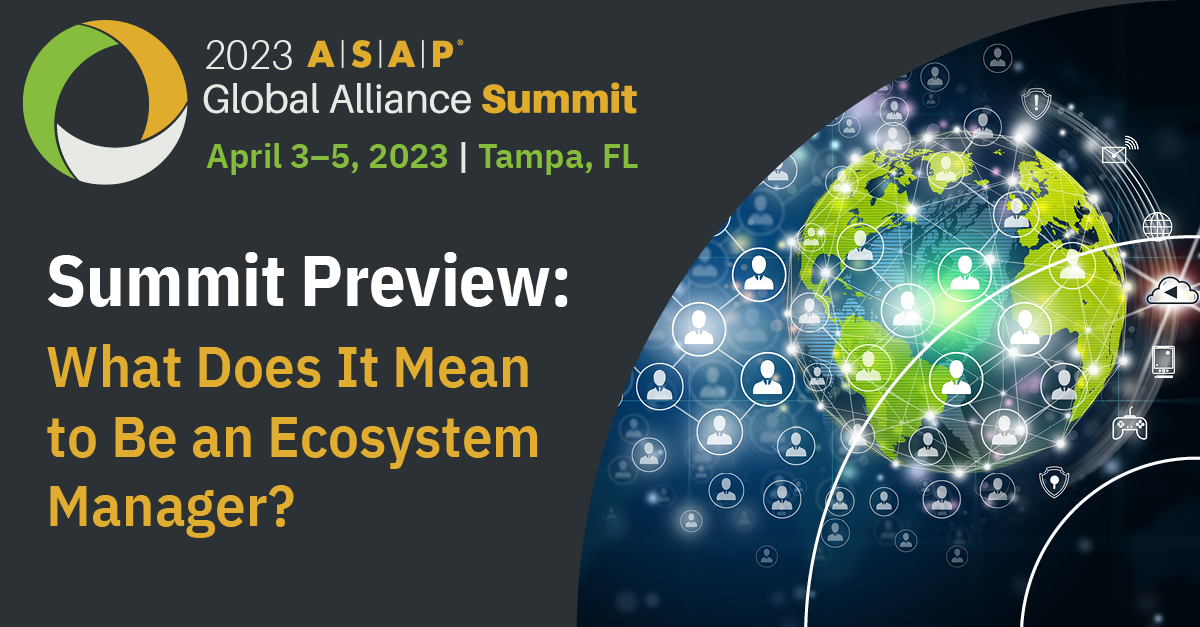Summit Preview: What Does It Mean to Be an Ecosystem Manager?
Alliance managers in the technology space have seen ecosystems transform their jobs significantly over the years. And yet, the truth is, we have barely scratched the surface of how ecosystems will impact the alliance manager’s job responsibilities, in all probability.
What exactly is the role of the “ecosystem manager”? If HR were to compose a job description for the position, how would it read? Do traditional alliance management practices apply to ecosystems? If so, which ones? These are some of the questions that will be explored during the session “Alliance vs. Ecosystem Capability: What’s the Difference?,” which will take place on the opening day of the 2023 ASAP Global Alliance Summit.
Revisiting and Rewriting the Alliance Handbook
It's also worth asking if these are even the right questions. The title “ecosystems manager” now describes a variety of roles; there are several types of ecosystems boosting company bottom lines across all vertical markets. Many still refer to multilateral alliances as ecosystems, for example. Then there are platform ecosystems, over which a collection of technology outfits use application program interfaces (APIs) to create new offerings together on top of a common platform (think Apple, Google, AWS, Microsoft, GE, and John Deere). Are the skills uniform across each ecosystem type?
“To what extent will the alliance capability hold in the ecosystem world? We’re going to discuss the skills alliance managers will need to add in order to become effective ecosystems managers and analyze the current core competencies that might warrant greater emphasis in these roles,” said Ard-Pieter de Man, CSAP, PhD, professor of knowledge networks and innovation at the Vrije Universiteit Amsterdam, who also advises clients on how to devise, implement, and manage their ecosystems.
Using real-life ecosystem case examples, this session will actively discuss the similarities and differences between traditional bilateral alliances and the different ecosystem types across all phases of the alliance life cycle. All the while, the discussion will have an eye on which parts of The ASAP Handbook of Alliance Management: A Practitioner’s Guide and its IT industry–specific supplement are most applicable to an ecosystem context and which parts might need revising as ecosystems of all types continue to evolve.
Honing Our Skills in Ecosystem Strategy and Execution
De Man’s copresenter, Leona Kral, CSAP, founder and chief connections officer at Mycelia Solutions, will share lessons learned from her recently completed 14-year stint at Verizon. Toward the end of her tenure at the telecommunications giant, Kral parlayed her role running a multilateral alliance with various original equipment manufacturers (OEMs) that aimed to connect PCs to Verizon’s network into a broader position driving alignment, efficiency, and profitability across all of the Verizon’s business units vis-à-vis its relationship with other Global 100 vendors. With this holistic view of Verizon’s activities, Kral and her team were ultimately able to optimize one of the company’s most strategically important multilateral alliances around Verizon’s 5G mobile-edge computing initiatives more effectively.
“Alliance managers are more than likely going to encounter some sort of ecosystems manager role—or at least elements of one—very soon, if they haven’t already,” she said. “They will need to determine the mutual benefit for their companies and the ecosystems they play in. In doing so, they will find that some of the skills we have honed as a community over the years managing traditional bilateral and multilateral alliances still apply, others may not, and some will need to be tweaked to fit these new contexts.”
And, of course, attendees will have the opportunity to address pressing concerns and conundrums that are not covered in the presentation in a Q&A at the end of the session—and during the many networking opportunities throughout the conference.
The 2023 ASAP Global Alliance Summit will provide quite a bit of other great knowledge for technology industry alliance professionals. The session “If You Build It…It’s Not Enough: Strategies for Entering Infrastructure- vs. Application-Based Ecosystems” will explore how your company can use ecosystems to maximize growth. Plus, all of the usual topics—from building an alliance practice to resolving conflict to trust-building—and a whole lot more will be covered in the rest of the conference agenda. Register now and join us in Tampa, Fla., April 3–5.

